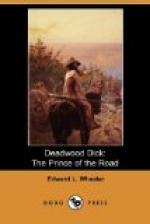On being asked the cause of his odd freak of dress, when he had joined the train a few miles out from Cheyenne, the youth had laughingly replied:
“Why, you see, it is to attract bufflers, if we should meet any, out on the plains ’twixt this and the Hills.”
He gave his name as Fearless Frank, and said he was aiming for the Hills; that if the party in question would furnish him a place among them, he would extend to them his assistance as a hunter, guide, or whatever, until the destination was reached.
Seeing that he was well armed, and judging from external appearances that he would prove a valuable accessory, the miners were nothing loth in accepting his services.
Of the others grouped about the camp-fire only one is specially noticeable, for, as Mark Twain remarks, “the average of gold-diggers look alike.” This person was a little, deformed old man; hump-backed, bow-legged, and white-haired, with cross eyes, a large mouth, a big head, set upon a slim, crane-like neck; blue eyes, and an immense brown beard, that flowed downward half-way to the belt about his waist, which contained a small arsenal of knives and revolvers. He hobbled about with a heavy crutch constantly under his left arm, and was certainly a pitiable sight to behold.
He too had joined the caravan after it had quitted Cheyenne, his advent taking place about an hour subsequent to that of Fearless Frank. His name he asserted was Nix—Geoffrey Walsingham Nix—and where he came from, and what he sought in the Black Hills, was simply a matter of conjecture among the miners, as he refused to talk on the subject of his past, present or future.
The train was under the command of an irascible old plainsman who had served out his apprenticeship in the Kansas border war, and whose name was Charity Joe, which, considering his avaricious disposition, was the wrong handle on the wrong man. Charity was the least of all old Joe’s redeeming characteristics; charity was the very thing he did not recognize, yet some wag had facetiously branded him Charity Joe, and the appellation had clung to him ever since. He was well advanced in years, yet withal a good trailer and an expert guide, as the success of his many late expeditions into the Black Hills had evidenced.
Those who had heard of Joe’s skill as a guide, intrusted themselves in his care, for, while the stages were stopped more or less on each trip, Charity Joe’s train invariably went through all safe and sound. This was partly owing to his acquaintance with various bands of Indians, who were the chief cause of annoyance on the trip.
So far we see the train toward the land of gold, without their having seen sight or sound of hostile red-skins, and Charity is just chuckling over his usual good luck:
“I tell ye what, fellers, we’ve hed a fa’r sort uv a shake, so fur, an’ no mistake ‘bout it. Barrin’ thar ain’t no Sittin’ Bulls layin’ in wait fer us, behead yander, in ther mounts, I’m of ther candid opinion we’ll get through wi’out scrapin’ a ha’r.”




